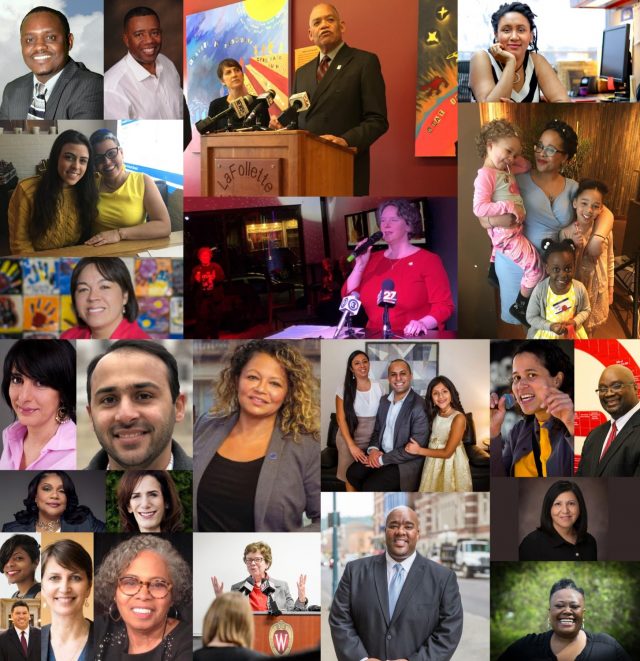Madison historically has three main power centers: UW-Madison, which is best known for the Badgers, but is also a center of entrepreneurship; the isthmus, the center of our city and county government as well as the center of our cultural life, which gives us our reputation as a city of progressives at best and out-of-touch hippies at worst; and what I call the Real Madison — the rest of the community, where people are just making a living and raising families day to day.
It’s in the Real Madison, outside those first two institutions, where most of the change is happening in the city. It’s the Real Madison, I think, that has driven monumental shifts in power over the last few years that culminated in this week’s election results.
Given those results, this is a unique time in the city’s history. Almost all the main power structures are run, in one way or another, by women and people of color — which means groups that have traditionally been marginalized now have unprecedented levels of power in this community.
At UW-Madison we have Chancellor Rebecca Blank. On the Isthmus we have the new Mayor-elect, Satya Rhodes Conway, the second woman and first openly gay person to hold that office. Arguably the most influential person in the city, Iranian-born Shiva Bidar, remains on the Common Council (and many other powerful boards and committees). The Common Council president is a Black man and an immigrant, and voters added three more people of color to the Council this week. Our District Attorney is a homegrown Black man.
And then in “Real Madison,” the core stability really has been anchored in the K-12 education system and our thousands of nonprofit organizations. The superintendent of schools is a woman (a woman, by the way, married to a Black man and mother to a child of color). As of Tuesday, all seven members of the school board are women — including three powerful women of color. Madison College, one of the true gems of this city, is run by a Black man. The biggest and most influential nonprofit organizations are run by women and people of color: Renee Moe, an Asian American woman, heads the United Way; Karen Menendez Coller runs Centro Hispano; Michael Johnson leads the Boys and Girls Club of Dane County; Sabrina Madison is attracting nationwide attention for the work she’s doing at the Progress Center for Black Women. Then you have Mr. Justified Anger himself, Rev. Alex Gee, who has become the city’s voice on race matters.
In the private sector you have Epic, which has single-handedly kept us in the game when it comes to attracting and retaining millennials, run by a woman.
And even many of the white men in positions of power — our County Executive. Chamber of Commerce president and Congressman, for example — have proven strong allies who don’t just talk a good game.
I could go on and on with names of major influencers like CUNA Mutual VP Angela Russell, retired education professor Gloria Ladson-Billings or American Family VP Telisa Yancy, who have been recognized nationally for their work. Or Vanessa McDowell, who runs the YWCA, or Ruben Anthony, CEO of the Urban League of Greater Madison, or Karen Lincoln Michel, the longtime journalist and Ho-Chunk Nation member who leads Madison Magazine.
All this to say: the groups that have been historically marginalized are now in control. Not just symbolically, not just in token ways, but in real positions of power and influence.
We don’t just have a seat at the table anymore. It’s our table now.
But around this table, we need to unify — I’m intentionally putting all marginalized populations on the same team because that’s how Madison sees us, but it’s also true that differing populations have different priorities. If we fail to recognize this — if we let ourselves turn on each other — we’ll be back where we were in five years, wondering what went wrong.
We can no longer say it’s “them” keeping us down or keeping us apart. Sure, the traditional power structures remain in place. We haven’t entirely dismantled the patriarchy or white supremacy or institutional racism quite yet. White men are still disproportionately represented on corporate and nonprofit boards. There aren’t enough teachers of color in our schools. Black men will still be arrested at higher rates than white men for the foreseeable future. And you can bet more racial slurs will slip out of the mouths of teachers frustrated by all the stresses they face, and more teachers and police officers will lay their hands on Black and brown bodies when they don’t have to.
But we can’t just chalk it up to them anymore — not here in Madison.
For all practical purposes, we are now them.
So, now what? In Madison we pride ourselves on disrupting or challenging systems. Well … now, we are running those systems. We have some of the highest racial disparities in the country but now, rather suddenly, we have some of the biggest opportunities to address the issues.
It’s time for boldness. Collaboration. A big, audacious vision. We have real challenges, and we’ve been saying for years we have what it takes to meet those challenges. Time to prove it, unified in purpose.




























